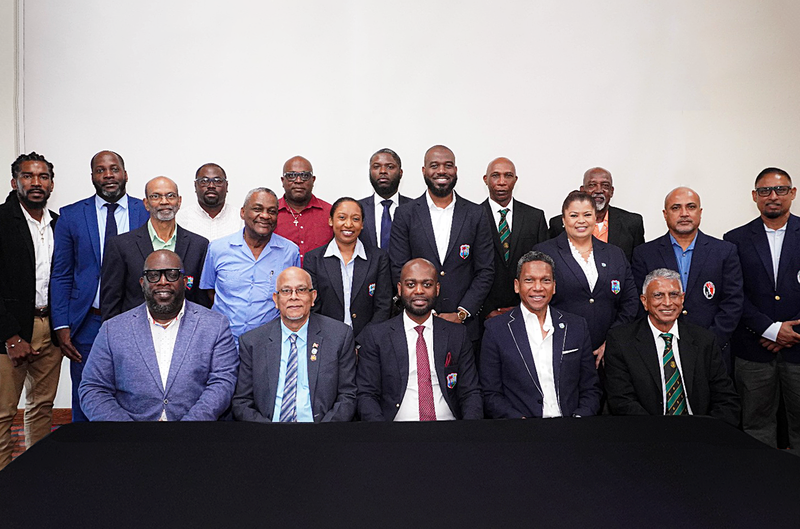**Cricket West Indies Passes Historic Governance Reform at Specia Meeting of Shareholders**
*Bridgetown, Barbados – February 10, 2025* – In a landmark decision that could shape the future of West Indies cricket, Cricket West Indies (CWI) has approved a historic governance reform during a special meeting of shareholders. The move is expected to modernize the administration of cricket in the Caribbean, addressing long-standing structural challenges and paving the way for a more transparent and efficient governing body.
### **A New Era for West Indies Cricket**
The special meeting, held in Bridgetown, Barbados, brought together key stakeholders, including representatives from all six territorial boards—Barbados, Guyana, Jamaica, Leeward Islands, Trinidad & Tobago, and Windward Islands. After extensive deliberations, the members voted overwhelmingly in favor of a series of constitutional and structural changes aimed at improving decision-making, financial management, and overall governance within CWI.
CWI President Dr. Kishore Shallow hailed the decision as a crucial step toward strengthening the foundation of cricket in the region.
“This is a momentous day for West Indies cricket,” Shallow said. “These reforms will enhance accountability, improve governance standards, and position CWI to operate more effectively in the modern era of professional sports administration. The shareholders have demonstrated their commitment to progress, and I am confident that these changes will have a lasting positive impact.”
### **Key Reforms Approved**
The governance overhaul includes several significant reforms that have been recommended by various independent reviews over the years. The main areas of reform include:
1. **Restructuring of the CWI Board**
– The CWI Board of Directors will be reduced in size to allow for more streamlined decision-making.
– Independent directors will be introduced to ensure greater impartiality and expertise in governance.
– Term limits will be established for board members and key executives to prevent stagnation and encourage fresh perspectives.
2. **Strengthening Financial Oversight**
– A new financial governance framework will be implemented to enhance accountability and transparency in financial management.
– Independent audits will be conducted more frequently to ensure compliance with best practices.
– A dedicated financial advisory committee will be created to oversee budgeting and revenue management.
3. **Greater Stakeholder Representation**
– Players, coaches, and other key stakeholders will have increased representation in key decision-making processes.
– Regional cricket associations will have a more direct role in shaping policies that affect grassroots development.
4. **Modernization of Cricket Operations**
– A new selection committee structure will be introduced, featuring data-driven and performance-based criteria.
– Player contracts and development programs will be revised to align with global best practices.
– Investment in grassroots cricket and women’s cricket will be prioritized.
### **Why the Reforms Were Necessary**
West Indies cricket has long struggled with governance issues, leading to inconsistencies in performance, financial difficulties, and conflicts between administrators and players. Several previous reports—including the 2012 Patterson Report, the 2017 Wehby Report, and the 2020 Caricom Cricket Governance Report—had all recommended significant changes to the way CWI is run. However, past efforts to implement reforms were met with resistance, often due to political and regional interests.
The latest move signals a shift in mindset, with cricket administrators recognizing the need for change in order to remain competitive in the modern game.
### **Reaction from Players and Cricket Experts**
Several former and current West Indies cricketers have welcomed the decision, calling it a much-needed step toward stability and progress.
Legendary West Indies captain Clive Lloyd, who has been vocal about governance issues in the past, praised the decision.
“This is a great step forward for West Indies cricket,” Lloyd said. “For too long, poor governance has held us back. If these reforms are implemented properly, they can help restore pride in West Indies cricket and bring back the consistency we need at the international level.”
Current West Indies captain Kraigg Brathwaite also expressed optimism about the changes.
“As players, we want to focus on cricket without the distractions of administrative problems,” Brathwaite said. “If these reforms lead to a more professional and structured environment, it will benefit both the senior and junior teams.”
### **Next Steps for Implementation**
With the governance reforms now officially approved, CWI has set a timeline for their implementation. A transition committee will be established to oversee the process, ensuring that the changes are executed smoothly over the next 12 to 18 months.
CWI CEO Johnny Grave emphasized that transparency and accountability will be key in this transition.
“We are fully committed to ensuring that these reforms lead to real, tangible improvements,” Grave said. “The cricketing world is evolving, and West Indies cricket must evolve with it. We now have a clear mandate to move forward, and we will do so with purpose and determination.”
### **Impact on West Indies Cricket’s Future**
The governance reforms come at a critical time for West Indies cricket, which has faced declining performances in recent years, particularly in Test and ODI formats. While the team has enjoyed sporadic success in T20 cricket, including two ICC T20 World Cup titles in 2012 and 2016, the overall structure of West Indies cricket has often been seen as outdated and ineffective.
With a more professional administration in place, CWI hopes to create a sustainable model that will strengthen domestic cricket, improve player development, and ultimately lead to better performances on the international stage.
### **Conclusion**
The passing of these historic governance reforms marks the beginning of a new chapter for West Indies cricket. While challenges remain, the commitment to modernization and transparency offers hope for a brighter future. If successfully implemented, these changes could help restore West Indies cricket to its former glory and ensure that the region remains a competitive force in world cricket.










